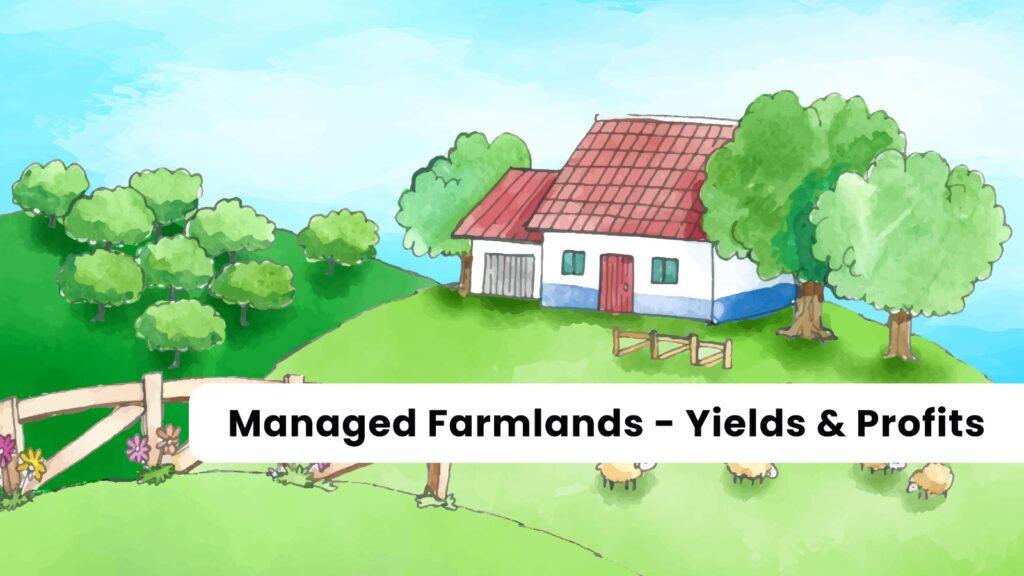Agricultural areas that are deliberately managed to maximize productivity and sustainability are referred to as managed farmlands. This strategy entails putting into action certain procedures and methods designed to enhance soil health, lessen erosion, conserve water, and use fertilizers and pesticides less frequently. Farmers can enhance agricultural yields and earnings while protecting the natural resources on their land by implementing these measures.
Soil health is one of the most important aspects of managed farmlands. By adopting cover crops, minimizing tillage, and rotating crops, farmers can enhance the health of their soil. Cover crops, like rye or clover, can enrich the soil with nutrients while reducing erosion. Reduced tillage can also enhance soil structure and reduce erosion. Crop rotation can enhance soil fertility and assist minimize the accumulation of pests and illnesses in the ground.
Managed farmlands priorities sustainability and long-term health of the land, while still producing high-quality crops. One important aspect of this is the use of integrated pest management (IPM) practices. Rather than relying solely on pesticides, IPM involves a combination of methods such as crop rotation, natural predators, and targeted pesticide use to manage pests and diseases in a way that minimizes harm to the environment and human health. By using IPM, farmers can reduce their reliance on harmful chemicals and promote a healthier ecosystem on their land.
Benefits Of Managed Farmlands
Managed farmlands offer a multitude of benefits, including increased crop yields. By implementing sustainable practices like crop rotation and cover cropping, farmers can improve soil health and fertility, leading to healthier and more productive crops. Integrated pest management techniques can also help reduce the need for harmful pesticides, creating a safer environment for both the farmer and the surrounding community. By reducing the environmental impact of farming practices, managed farmlands can help farmers meet regulatory requirements and maintain long-term sustainability for their operations. Ultimately, the benefits of managed farmlands extend beyond the farm, contributing to improved profitability, environmental health, and community well-being.
A Strategy For Boosting Revenue And Yields
With managed farmlands, farmers can employ a number of ways to increase their yields and earnings. Crop rotation, which includes switching up the crops cultivated on a specific field each year, is a crucial strategy. By doing so, the risk of pests and illnesses is decreased, and soil degradation is prevented. Use of cover crops, which are put in between primary crops to assist improve soil health and stop erosion, is another tactic. Additionally, farmers can use precision agriculture methods to maximize the use of fertilizer and pesticides while minimizing waste, such as GPS mapping and variable rate technology.
Regularly monitoring and maintaining infrastructure is a crucial tactic for maximizing yields and earnings on managed farmlands. This entails maintaining fences, inspecting irrigation systems, and making sure tractors and other equipment are in good operating order. Farmers should also be open to try out new methods and practices and keep up with the most recent research and technology in their industry. Farmers may boost productivity and profitability while fostering sustainability and environmental care by managing their farmlands proactively.
Picking The Best Management Company
The correct management company must be chosen in order to apply managed farming practices. Find a business that has expertise in your particular crop and area and a proven track record of boosting yields and profits for clients. The sustainability and environmental stewardship of their operations should also be taken into account, as these aspects may affect your farm’s long-term profitability. Before making a choice, don’t be hesitant to conduct research and enquire about recommendations.
Monitoring Progress And Modifying
The capacity to gauge and monitor progress is one of the essential elements of successfully managed farmland. This involves tracking changes in resource use, soil health, and crop production over time. Farmers can pinpoint areas for improvement and modify their management plans by routinely gathering and analyzing data. In addition to maximizing yields and profitability, this also encourages sustainability over the long term and environmental responsibility.
Conclusion
The top professionals in the field are employed by Mogg’s Estates – a managed farmland company in Bangalore. Our main goals are to produce crops that are wholesome and nutritious for you while ensuring sustainability in every aspect of our farming operations. Additionally, our farm managers regularly check the soil to maintain its fertility and make sure no dangerous pests are present that could ruin the crops. Additionally, they assume full responsibility for marketing your crops and paying you the proceeds.
If you are also interested in the numerous advantages of managed farmlands, Mogg’s Estates is always willing to assist you. Call us at 9513655556 for more information.




